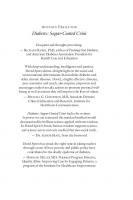Who Gets It When You Go?: Wills, Probate, and Inheritance Taxes for the Hawaii Resident (Third Edition) 9780824843113
This book explains in uncomplicated language what can happen to a person's property at death. A significant number
180 64 8MB
English Pages 136 Year 2021
Recommend Papers

- Author / Uploaded
- David C. Larsen
File loading please wait...
Citation preview
W h o Gets It When You Go?
Who Gets It When You Go? WILLS, PROBATE, AND INHERITANCE TAXES FOR THE HAWAII RESIDENT THIRD
EDITION
David C. Larsen
A Latitude 20 Book U N I V E R S I T Y O F HAWAI'I PRESS HONOLULU
Copyright © 1980, 1986, 1997 by David C. Larsen All rights reserved Printed in the United States of America First edition 1980 Second edition 1986 Third edition 1997
05 06 07 08 09 10
7 6 5 4 3 2
Library of Congress Cataloging-in-Publication Data Larsen, David C., 1944Who gets it when you go? : wills, probate, and inheritance taxes for the Hawaii resident / David C. Larsen. — 3rd ed. p. cm. "A Latitude 20 book." ISBN 0-8248-1940-3 (pbk. : alk. paper) 1. Wills—Hawaii—Popular works. 2. Probate law and practice—Hawaii—Popular works. 3. Estate planning—Hawaii—Popular works. I. Title. KFH142.Z9L37 1997 346.96905'2—dc21 96-37534 CIP Book design by Roger Eggers Cover design by Santos Barbasa, Jr. Line illustrations by Steve Reoutt Printed by The Maple-Vail Book Manufacturing Group
University of Hawai'i Press books are printed on acid-free paper and meet the guidelines for permanence and durability of the Council on Library Resources. www.uhpress.hawaii.edu
To my wife, Pam
The author specifically disclaims any personal liability, loss, or risk incurred as a consequence of the use and application, either directly or indirectly, of any advice or information presented herein.
Contents
PREFACE O R G A N I Z E "VBUR A S S E T S 1. IF YOU D I E W I T H O U T A W I L L 2. Y O U R W I L L
K
XI I I 3
3. PROBATE
48
4. H O W T O A V O I D P R O B A T E
68
5. T H E FEDERAL ESTATE TAX AND H O W TO R E D U C E I T
88
6. T H E HAWAII INHERITANCE TAX
114
PUTTING IT A L L TOGETHER
11 Y
GLOSSARY
J 19
Preface
T H E purpose of this book is to explain in uncomplicated language what can happen to your assets when you die. It is written specifically for the Hawaii resident. The book takes an overview of a subject that many know very little about, but one that affects each of us. The laws on dying without a will, wills, trusts, probate, and death taxes are numerous, complex, and change frequently. To try to make some sense of the broad scope of estate planning, I've done two things to make the book understandable and simple. First, I have chosen not to discuss every rule, every regulation, or every conceivable situation that might arise. Many of the exceptions have been eliminated, so that what remains are the basic rules that will give you an idea of what you can do to protect your beneficiaries and assets after your death. Second, I have eliminated technical terms and "legalese" in favor of plain English. For example, I use the word "executor" instead of other terms that may be more technically accurate but which mean essentially the same thing, such as executrix, administrator, administratrix, administrator (or administratrix) de son tort, administrator (or administratrix)
X
Preface
de bonis non, and personal representative. Similarly, where a choice arises between a technically correct but unusual word and a less accurate but more commonly understood word, I have chosen the latter. Two final points. First, and most obvious, don't take any action solely on the basis of what you read here, but see your attorney, tax accountant, or tax adviser first. This book is not a "how to" book, but is designed only to introduce you to a complex subject. Second, in an effort to keep the book to a manageable length, many rules, definitions, and ideas are not repeated after their first mention. The book starts with the simplest rules and definitions and builds upon them. I suggest that, in reading the book, you begin at the first chapter and read through the chapters consecutively, even though you think a particular chapter may not apply to you. The easiest rules are those dealing with dying without a will, and that subject is discussed in chapter 1. In fact, many people in Hawaii die without a will, thinking that they are taking the "easy way out." Chapter 1 explains why they might be wrong.
Organize Ybur Assets
heirs can't get more than you own. What do you have? Take a few minutes to fill out the following checklist. Like most people, you'll find that you're probably worth more than you thought (so that's nice news). This checklist helps with the rest of the book, since it "personalizes" the following pages. A few simple instructions: Put down the present fair market value of each asset, not what you paid for it; round off all figures to the nearest $1,000; if you get stuck on an item, leave it until later. YOUR
Your spouse owns
You own Checking account Savings account T-bills, money market, certificates, C/Ds Stocks Bonds
$
$
You + your spouse own together S
xii
Residence (subtract mortgage)
Organize Your Assets Your spouse owns
You own
You + your spouse own together
I
$
8
$
S
S
Other real estate (subtract mortgage) IRA Pension/profit sharing Life insurance Company-provided life insurance Money owed to you Deferred compensation Automobiles Jewelry Household items TOTAL
I.
If You Die W i t h o u t a W i l l
are two ways you can die without a will. First, if you never wrote one. Second, if you wrote one but it's declared invalid by the probate court (see chapters 2 and 3). In either case, you are said to have died "intestate," that is, without a valid will. If you die intestate, Hawaii has special laws, called the "Laws of Intestacy," which control the disposition of your property. ("Property" simply means your assets.) However, there are three types of property to which these laws do not apply. They are: Life Insurance and Retirement Plan Proceeds. Whether you die with a will or without a will, life insurance proceeds are paid to the beneficiary you named in the policy. If you did not name a beneficiary in the policy or if all the named beneficiaries died before you did, then the proceeds are subject, if you die intestate, to the Hawaii laws of intestacy. Retirement plan proceeds are treated in the same manner as life insurance proceeds: they are paid to your named beneficiaries or, if all of the beneficiaries are dead, to your estate, which, if you die intestate, the laws of intestacy control. THERE
2
If You Die Without a Will
Property Owned Jointly with Another with a Right of Survivorship. The ownership, or "title," of particular types of property is recorded at an institution. For example, a car, boat, bank account, stocks, bonds, home, and land all have their owners listed and recorded with some institution. If one such item is owned by more than one person, what happens to the property if one of the owners dies intestate? Who gets the dead person's share? Well, the answer is, "It depends." It depends on the way the title to that property was held by the co-owners. Two or more persons can hold title to property in three different ways. Two of them avoid the intestacy laws. Joint Tenancy. Where two or more persons own property as "joint tenants with right of survivorship," when one owner dies, whether with or without a will, the deceased tenant's share goes automatically to the remaining joint tenant or is divided among the remaining joint tenants. The intestacy laws do not apply to the deceased's share. Example: Mother, Father, and Daughter own tide to their house as "joint tenants with right of survivorship." This title is recorded at the Hawaii State Bureau of Conveyances and/or the Land Court. Daughter dies. Mother and Father now own the house as "joint tenants with right of survivorship": the Daughter's share is not subject to the intestacy laws and is automatically merged into Mother's and Father's shares. When Father dies later, his share is not subject to the intestacy laws and Mother becomes the sole owner. But when Mother dies, because there are no more joint tenants with her, the entire property is disposed of by the intestacy laws if Mother died intestate, or by her will if she died with one. Tenants by the Entirety. This is a joint tenancy between a husband and a wife and no one else. When one spouse dies, whether with or without a will, the other automatically gets the entire property. The deceased spouse's share is not subject to the intestacy laws. It goes automatically to the surviv-
If You Die Without a Will
3
ing spouse. Later, however, when the surviving spouse dies, the entire property is disposed of by the intestacy laws if he or she died intestate, or by his or her will if there was one. Tenants in Common. If the title to the property doesn't say "joint tenancy with right of survivorship" or "tenants by the entirety" and it's owned by two or more persons, then the law says that it is held by those persons as "tenants in common." There is no other way it can be held. Under this form of ownership, when one owner dies, his or her share is not merged automatically into the shares of the other owners. If the deceased owner died intestate, his or her share would be subject to the Hawaii intestacy laws; if he or she died with a will, the share would be subject to the will. The remaining owners will then own the property with the heirs of the deceased owner. Example: John, Mary, and Peter own a piece of land. The deed gives it to them as "tenants in common." The deed states that John's share is 40 percent, Mary's is 50 percent, and Peter's is 10 percent (if the deed didn't mention different percentage interests, the ownership would be equal). John dies without a will. His 40 percent interest goes not to Mary and Peter, but to his heirs. Mary and Peter now have new co-owners. Property Held in a Living Trust. Property held in a trust you set up while you are living (a "living trust") is not subject to the intestacy laws, and goes, at your death, to the persons you name in the trust. The trust alone controls where the trust property goes. See chapter 4 for more on trusts, which have rightly been called "the most useful estate planning tool available." We can summarize the above in this way. All property held in your name alone, as well as your share as a tenant in common with other people, is subject to the intestacy laws if you die without a will. Let's take an example. Usually, married
4
If You Die Without a Will
couples own their homes as "tenants by the entirety" (but check your deed to be sure). Their life insurance proceeds are payable to some named beneficiary. Thus, those two items won't be subject to the intestacy laws. But what about household furniture? Clothing? Personal effects and jewelry? The car in one name alone? The bank account in one name alone? The stocks and bonds in one name alone? All of these items, if held in one name alone or if held with others in a tenancy in common, are subject to the intestacy laws. We can see this clearly with a diagram. Just divide your property into two boxes: LST Property
Intestacy Property
Life insurance and retirement plan money, Survivorship property (i.e., property held in joint tenancy with right of survivorship or in tenancy by the entirety), and property held in a living Trust (LST) go in one box. All your other property goes into the other box and is the only property subject to the intestacy laws. How do the Hawaii intestacy laws distribute your intestacy property? Who gets what? (Remember, you have no say because you didn't write a valid will.) Let's look at the following examples. You'll see that who gets what depends on where the person is on your family tree. The first six examples are for a single person dying intestate—either a person who never married, or one who was divorced at time of death, or one who was a widow or widower at the time of death. Examples 7 through 9 are for a person who is married when he or she dies, and neither the deceased nor the surviving spouse has any children outside that marriage to each other. Examples 10 through 11 are for a person who is married when he or she dies, and either the deceased, or the surviving spouse, has one or more children from a relationship or marriage outside the present marriage.
If You Die Without a Will
5
1. You (D) die. Your Mother (M), Father (F), Children (C), and grandchildren (GC) survive you. (An X over the letter symbol indicates deceased. You (D) may be either male or female.) •M
X H -
r
GC,
SL
GC,
i
GC,
Here, F and M get nothing because you have living descendants. C „ C 2 , and C 3 get one-third of your intestacy property each. If C 3 were deceased, C, and C 2 would get one-half each. 2.
-M
X H
X
I - — I
GC,
GC2
1
C3
c2
I
GC3
Here, C 2 and C 3 get one-third each, and C,'s one-third goes equally to GC, and GC 2 for one-sixth each. 3.
T X
•M
+
& GC,
^ GC2
c3
GC3
Here, C 3 gets one-third, and GC,, GC 2 , and G C 3 equally split C,'s and C 2 's two-thirds, for two-ninths each.
6
If You Die Without a Will 4.
F
1
M
X Here, because there are no descendants, F and M get 100 percent of the intestacy property; if one of them is deceased, the surviving parent gets all the intestacy property. 5
X
|
M
t I
B
S,
Here, Brother (B) and Sisters (Sj and S 2 ) get one third each. If one or more of them is deceased, their shares go to their descendants as explained in examples 1 - 3 above. 6. If you die with no descendants, no parents, no siblings, and no descendants of siblings, then we go up to your grandparents, then out to aunts and uncles, then to their descendants (cousins and their descendants)—we will find someone, somewhere, who will get your intestacy property. If we can't, it goes to the State of Hawaii. 7.
•M x i c,
r
Sp
1 c,
Here, even though you have descendants and parents, because you are married, your Spouse (Sp) takes all your intestacy property. 8.
-X &
Sp
Here, because you have no descendants and no parents, Sp gets all your intestacy property.
7
If You Die Without a Will 9
•
F
1
M
Sp
X
Here, Sp takes the first $200,000 of your intestacy property, and three-fourths of the rest; F and M get the last one-quarter of the rest. If F or M is deceased, the survivor takes that one-quarter; if they are both deceased, you are back at example 8. 10.
-M f
- T - - -
I—1—I
I
c,
c2
s
"
C3
Here, you have a descendant (C,) from a marriage or relationship other than with your Sp who survives you. Sp gets the first $ 100,000 of your intestacy property, and one-half of the rest; the other one-half goes equally to C 13 C 2 , and C 3 . If you and Sp never had any children (so C 2 and C 3 don't exist), C^ would get that last one-half. 11.
•M
X
I i—1—l
c,
CI
Sp









